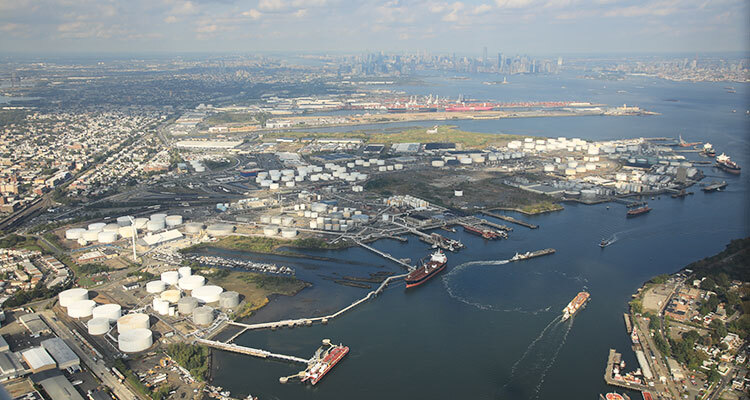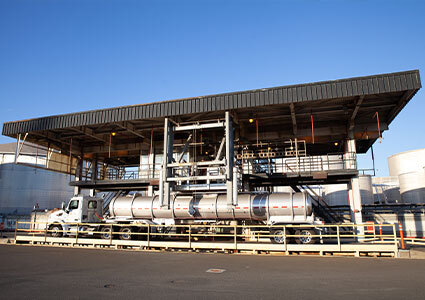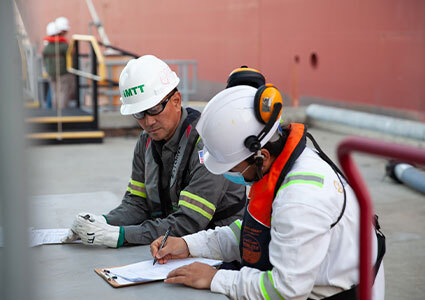
How IMTT is supporting the sector for a more sustainable future
Headquartered in New Orleans, Louisiana, IMTT is one of the largest independent bulk liquids storage and logistics providers in North America. Proud and committed to providing a safe and reliable service across the US and Canada, IMTT supports the areas in which it operates with robust economic activity, sustainable jobs, and community commitment.
 With over 80 years in business, and operating from 11 locations, IMTT handles and stores a wide variety of bulk liquids, including chemicals, vegetable and tropical oils, renewable fuels, and crude and refined petroleum products, boasting a capacity of more than 40 million barrels. Its assets are strategically located along major waterways and near key distribution hubs throughout North America to facilitate the efficient storage and movement of customers’ feedstocks and products.
With over 80 years in business, and operating from 11 locations, IMTT handles and stores a wide variety of bulk liquids, including chemicals, vegetable and tropical oils, renewable fuels, and crude and refined petroleum products, boasting a capacity of more than 40 million barrels. Its assets are strategically located along major waterways and near key distribution hubs throughout North America to facilitate the efficient storage and movement of customers’ feedstocks and products.
Proudly serving leading refiners, chemical manufacturers, and distributors, IMTT’s years of experience as an industry leader enable it to respond to clients’ needs. In December 2020, the company was sold to Riverstone, a global private equity firm with over $40 billion of assets under management.
Future focus
We caught up with Carlin Conner, Chairman & CEO, to discuss IMTT’s evolution over the past three years. “We believe the bulk liquid storage industry will play a crucial role in global decarbonization as well as continuing to serve legacy petroleum. Our mission is to continue to provide a safe and reliable service to our existing customers and identify opportunities to contribute to the global decarbonization effort by supporting sustainable, less carbon intensive energy sources,” he begins.
“Since we took over IMTT we have re-invested over $400 million in our ‘Greener and Cleaner’ program. This is a strong, action-based strategy that focuses on reducing our legacy footprint while growing our renewable and clean fuels. We’re investing today to put sustainability at the heart of our business and adapt our infrastructure to alternative sources of energy, including all bio fuels like ethanol and the feedstocks required to make renewable fuel products, among others.
“As we think about moving forward, we have projects that we’re working on that leverage our expansive waterfront capabilities while utilizing available land in locations where feedstocks are readily available. In addition to our renewable fuels growth we are also working with companies developing energy transition products like blue ammonia. On the renewable fuels front, we have an ongoing project at our Geismar facility, which is upriver from New Orleans, where we have contracted with a multi-national oil company to receive and handle renewable diesel feedstocks produced at their plant, building six new tanks and dock related infrastructure. We will deliver the feedstock via pipeline to their renewable diesel plant and receive finished renewable diesel back for distribution to the market. That’s a notable project, north of $100 million and is a mirror image of a project that we commissioned last year at our St. Rose Terminal.
“Additionally, we just completed a project for a major methanol producer, where we built more methanol storage for them, including some dock infrastructure. We continue to support our existing customer base on a range of different projects,” Carlin highlights.
“When we bought IMTT three years ago,” he continues, “part of the theory behind the investment was being able to leverage existing industrial footprints for energy transition and growth in the petrochemical sector based on natural gas driven economics. Marine infrastructure we control is a key component of our strategy as we determined that marine trade of hydrocarbons and de-carbonized products was here to stay and even grow in volume. Creating deepwater access for large vessels is probably going to play an extensive part in enabling some of the solutions going forward. As such, we created our strategy to continue being able to provide ongoing support for the legacy petroleum business, which is still very robust, but at the same time, to invest our cash flow into energy transition projects. We were very intentional about how we would allocate business development resources to pursue cleaner, greener projects for the future and have focused our energy on that.”
Indeed, this intention permeates every aspect of the company’s culture and evolution. “As the new management of IMTT,” Carlin continues, “in terms of organizational culture, we had to highlight that this was an important shift and focus on the future as opposed to what has historically been done. The company is more geared and open now to new products and boasts a greater ability to attack this growing market.”
Community leaders
Looking ahead, Carlin shares his thoughts on the future of IMTT. “As we are a vendor, and not a market maker, we’re not on the front line in terms of generating new technologies. Our organization is set up to support the producers, traders and consumers of this world and help them realize their goals and this is what we do best. In five years, I hope that we will continue to experience growth in terms of our renewable footprint, including renewable diesel and de-carbonized ammonia projects, and that there’ll be more discussion around other renewable solutions.
“We’ve gone from roughly 65 percent of our revenue coming from legacy petroleum, and now, as we exit 2023, the share of legacy petroleum is less than 45 percent and trending down further. So, we’ve basically re-shaped the business to become a ‘Greener and Cleaner’ terminals company that also handles legacy petroleum. In a capital-intensive business like ours, that’s difficult to do without shrinking, but we didn’t, we grew. We changed the shape and feel of the business to have a much more sustainable story. The transition will take time and as such, legacy petroleum will still be essential. We need to be able to support that sector but also, be able to handle energy transition projects as they unfold.”
Coming to the end of our conversation, Carlin is proud to reinforce IMTT’s commitment to the communities in which it works. “We strive to be good community partners; it’s part and parcel of our values and who we are as people. We believe that our presence in these communities is much more than a physical footprint and revenue generation. We work hard to be community leaders; not only in terms of offering financial assistance, but also mentorship and support. We listen to our communities to ensure that our impact will be a positive one.
“We want our employees to be proud,” he concludes. “They can be proud because we’re a financially and operationally successful company, but the real pride comes when people hear what we’re doing for the community. This is more meaningful and impactful, and our employees can hold their heads high and be proud of who they work for.”